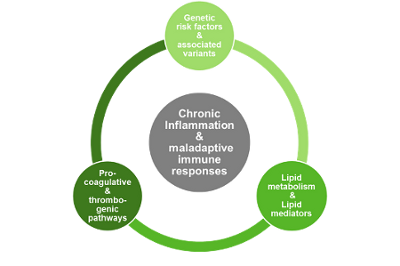About us
Vascular disease including coronary artery disease (CAD) and stroke remains the leading cause of death and morbidity worldwide despite significant advances in interventional and medical treatment. The enormous socio-economic costs imposed by CAD on European healthcare systems continue to rise. This dilemma could be limited by improving vascular prevention and therapy based on a more refined mechanistic pervasion of atherosclerosis as the underlying pathology, prompting a more efficient and reliable identification and verification of new targets for potential translation to drug development.
Hence, it is the mission of the planned CRC 1123 to improve the in-depth understanding of molecular networks in atherogenesis, atheroprogression and atherothrombosis as the pathological sequence of CAD, leading to the identification of worthwhile targets for treating atherosclerosis. An identification of worthwhile candidates within such networks requires an unbiased screening of different targets on a thorough pathogenic basis and analysis of their interactions in relevant model systems in vivo.
We aim to systematically elaborate such intricately linked molecular mechanisms for different target families (cytokines, signal proteins, nucleic acids and lipid mediators), allowing for a sufficiently broad yet coherent spectrum. We will propagate their validation by employing novel technologies for optoacoustic and super-resolution imaging and an array of transgenic and knockout mouse models of conditional gene deletion, knockin insertion of mutants and/or fluorescent labeling. We aim to implement harmonized model systems and standardized protocols and to employ bio-informatics network analyses to adequately map the pathogenic complexity and to identify the cross-talk and interaction of new molecular mechanisms and individual targets. This will help to redefine the standards of target discovery and validation and to open new therapeutic options.


